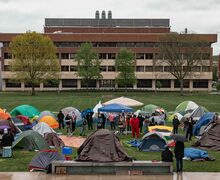Q&A with Chancellor Nancy Cantor
What are some of the goals that you want to bring to the university in year one?
I want to really come in and try to galvanize a set of conversations within the university community. If we’re going to really understand what it means to educate students for the 21st century, we have to come at it from everybody’s own little silo, if you will. It means we have to come together and challenge each other in those conversations.
I really didn’t want to just come in and say, ‘These are the programs that we’re going to implement,’ but instead to come in and intersect the views that I have with what people are really passionate about here.
There’s been this idea of ‘on the Hill’ and ‘off the Hill’ concerning the university’s relationship with the city. Do you think breaking that down should be a priority?
Absolutely. My sense is that in the last five to eight years of Shaw’s chancellorship that image has really started to break down. … I want to look at all of Syracuse’s extraordinary cultural opportunities and engagements. I think that’s a perfect area to come together. The really tricky thing, though, is the history of viewing us as ‘on the Hill’ means that it frames anything we do with a certain level of understandable suspicion. Are we the great colonists coming out, giving our wares and using the city? I don’t think Syracuse is that way at all.
Every year the Princeton Review comes out with their rankings of all the schools, and we’ve always been at the very top of Tier 2, but never Tier 1. Would you say that’s a goal for you before you hang it up as chancellor of Syracuse?
You’re already thinking of me hanging it up! To be very frank with you, I have two completely discordant reactions to all these rankings. On the one hand, those kinds of rankings … can never capture the character of a place, and are going to miss an enormous amount. On another level, I would always want to say that our aspiration as an institution is to play absolutely in the biggest league we can play.
We changed our nickname to ‘The Orange’ over the summer. What are your feelings on the change?
I love Otto the Orange, so I am happy to see that we can do it around the Orange. The actual logo I think looks pretty good to me. So, in that sense, I’m fine with it.
Over the past two years now we’ve had Operation Prevent that’s been shutting down bars and giving court summons for fake IDs. What’s your opinion on that?
In the SU welcome week, there’s been a lot of conversation about it. From my perspective, the most important thing is how we engage with each other and not get derailed by any particular type of activity, and certainly not an illegal one. We’ve got to be an administration that can speak frankly about this. The issue that nobody talks about is the issue of taking responsibility for the community one creates on campus.
Students have a huge piece of what community we create. So much of the unintended consequences of drinking when it gets out of hand, is that it erodes the quality of the community. We all have different ways of going about it, but I encourage students to come together and talk about ways to fix the problem.
About a year and a half ago there was an instance of blackface on campus that led to a protest in front of what is now your office, and there have been several instances since then which have underlined a theme of racial tension on the campus. Have you gotten a sense of that since you’ve been here?
This is another one of those things that I think Syracuse is by no means unique and alone in this, and on the other hand, we have to own it ourselves and work on what it means here. It would be pretty surprising if universities didn’t have the same level of racial tension as our society does. People come to these campuses having grown up going to segregated schools. Not by law, but socially … It’s a challenge that higher education has to take as a huge responsibility.
The university’s Department of Public Safety is in the process of being upgraded to peace officer status. What do you think about the change?
Both Michigan and Illinois (where she has worked previously) had armed campus police, and it was actually enormously helpful. The campus police were involved in the life of the campus and knew how to read situations. There was an ability to regulate their behavior. There is much to be gained from having people on a campus who are committed and responsible agents of the campus, and having them feel fully able to be in control of a situation. I always found it extremely comforting at Illinois and Michigan. It helped the relationship with the city and the campus when we had a series of crimes against personal property. We were able to do a task force with both the city police and the campus police.
Voting for Bush or Kerry?
You know I’m not going to answer that! But just vote! I encourage all of you to vote.
Published on August 29, 2004 at 12:00 pm




